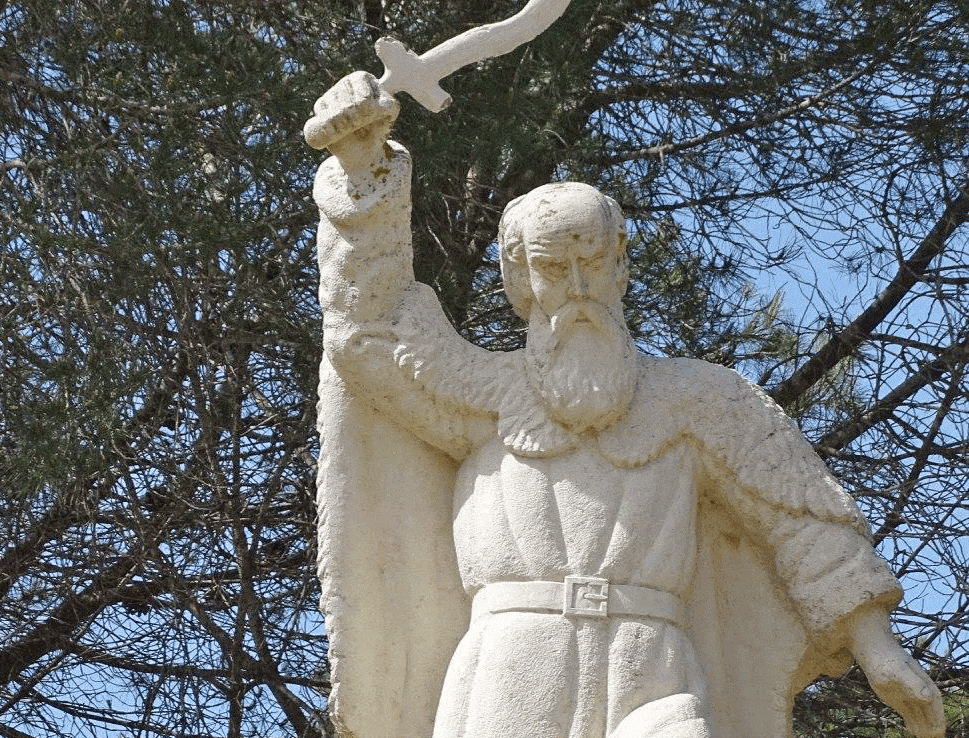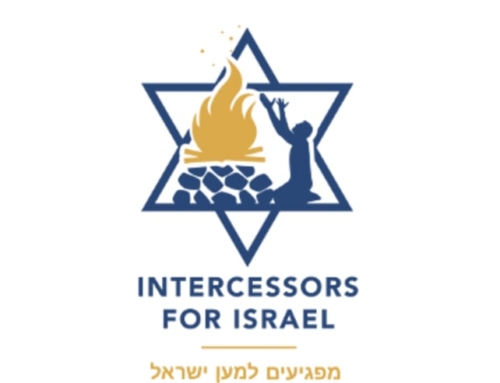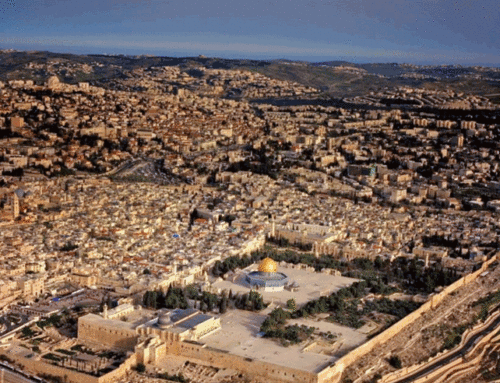[Editor’s Note: the following information and prayer points are excerpted from the weekly email of Martin & Normal Savris in Jerusalem.]
THE 17TH OF TAMMUZ, THE “FAST OF THE FOURTH MONTH”—AND THREE WEEKS “BETWEEN THE STRAITS”.
“From the straits I called to Yah. Yah answered me in a wide-open place. The LORD is for me, I shall not fear. What can humankind do to me…All the nations surrounded me. With the LORD’s name I cut them down. They swarmed round me, oh they surrounded me. With the LORD’s name I cut them down…You pushed me hard to knock me down, but the LORD helped me. My strength and my might [song] is Yah, and He has become my rescue [Hebrew: yeshu’ah—‘salvation’]” (Psalm 118:5-14—Robert Alter translation).
On June 25th we entered into the fourth Hebrew month, Tammuz. It is not mentioned in the Bible by this (Babylonian) name. Yet most certainly “the Fast of the Fourth Month” of Zechariah 8:19 refers to an ancient memorial set within this month to soberly remember the breaching of the walls of Jerusalem by Nebuchadnezzar in 586 B.C. (II Kings 25:3-4; Jer. 39:2; 52:6-7). The fast, observed originally on the 9thof the month, has since the destruction of the Second Temple been observed on the 17th —the date in 70 C.E. when the wall was again breached, this time by the Romans. This year, the 17th of Tammuz falls on the 11th of July.
The 17th of Tammuz marks the beginning of a three-week period sometimes known as “the Dire Straits” or in Hebrew Bein haMetzarim—“between the narrow places.” The expression comes from Lamentations 1:3, “All her persecutors overtake her in dire straits” (NKJV). It alludes to many calamities which have overtaken Jews and Israel herself over the centuries during these three weeks. The period ends on the 9th of Av (1 August this year), when the First Temple was actually destroyed.
Jews within Israel and around the world are aware of this period. In Israel, religious weddings do not take place during these three weeks. And at the end of each Torah reading in synagogues, special readings of “affliction and admonition” takes the place of the passages from the Prophets which would normally close the service.
Although it is certainly true that the events occurring during this period have given rise to superstitions and fallacies over the centuries, we see it, nevertheless, as a time for special sobriety and watchfulness among believers—especially as regards Israel and the seed of Jacob. It is as though, with the coming of this season, an awakening occurs amongst spiritual powers towards taking advantage of areas of vulnerability, of gaps in the armor of God’s covenant people. This as a time for stressing the sovereignty and omnipotence of Elohei-Yisrael—The “GOD OF ISRAEL” (Genesis 33:20); of Magen-Avraham—the “SHIELD OF ABRAHAM” (Genesis 15:1). T
The Earth is the LORD’S—and He is expanding His Kingdom through both space and time, including this season associated with distress! It is a time for believers in Israel to look forward with the spirit of Caleb and Joshua, to ‘take the territory’, a time when the very giants which loom shall “be our bread; their protection [Hebrew: “shadow”] has departed from them, and YHVH is with us. Do not fear them!” (Numbers 14:9).
PLEASE PRAY:
*Angelic protection over Israel, over her borders, over the minds and integrity of her leaders during this three-week period, 11 July—1 August. Indeed, pray protection over Jews throughout the world during this time.
*For spiritual discernment and integrity over the Body of Messiah in Israel in separating the true from the superstitious! In being sober-minded on the watch, when God says, “Watch!” (I Peter 5:8; Col. 4:2)
*For the merciful conviction of Jewish hearts by Ruach haKodesh (The Holy Spirit) during this period—conviction of sin and righteousness and judgment (John 16:8). Pray for revelation of the ONE who came to redeem us from the straits of sin to release us into a wide place of freedom and life!
*We would strongly recommend praying Psalm 118:5-14 (See beginning of this section)—as well as Psalm 4:1:
“When I call, answer me my Righteousness-God—In a narrow place you have made wideness for me. Grace me and hear my prayer!”
THIS WEEK’S TORAH PORTION:
From ancient times there has been a weekly portion (Parashah) from the first five books of Moses (The Torah) and an ending (Haftarah) from the Prophets read on the Sabbath in synagogues around the world. This portion is given a Hebrew name drawn from the opening words of the Torah passage. An illustration of this practice appears to have been recorded in Luke 4:16 where Yeshua (Jesus) arrived in the synagogue in Nazareth and was asked to read the portion (Isaiah 61) from the Prophets. We have found that in perusing these weekly readings, not only are we provided opportunity to identify in the context of God’s Word with millions of Jewish people around the world, but very often the Holy Spirit will illumine specific passages pertinent that week in our intercession for the Land and people of Israel. The Haftarah, unless otherwise noted, will be that read in Ashkenazy synagogues around the world. The references for all texts are those found in English translations of the Scriptures.
The Parashah for this week 9-15 July 2017 is called Pinhas—“Phinehas”:
TORAH: Numbers 25:10—29:40
HAFTARAH: Jeremiah 1:1—2:3 (First “Haftarah of Affliction/Admonition”)
Note: During the three-week period “between the straits” (the 17th of Tammuz through the 9th of Av) the usual Haftarah portions (for this week, I Kings 18:46—19:21) are replaced by special “Haftarah’s of Affliction/Admonition”), calling Israel to sober contemplation of her sin and her deserving of severe judgment—and of the Love of her God still drawing her to repent and return to Him.
THE ZEAL OF THE LORD
“I have been very zealous for YHVH God of Armies…”
(II Kings 19:14; From the Haftarah usually accompanying Parasha Pinhas)
Statue on Mount Carmel of Elijah slaughtering the prophets of Baal.
*Numbers 25: 11, 13. “Phinehas the son of Eleazar, the son of Aharon the Priest has turned back My wrath from the children of Israel, because he was zealous with my zeal among them, so that I did not consume the children of Israel in My zeal…He was zealous for his God, and made atonement for the children of Israel”.
The Hebrew word Kinah Biblically may be translated either zeal (NKJV) or jealousy (NASB). Holy zeal is a burning passionate jealousy on behalf of something or someone good and deeply loved. Phinehas was zealous for “the honour of his God” (25:11,13 NIV). In a psalm foreshadowing the coming Messiah, David sang of his zeal for God’s House (Psalm 69:9; John 2:17), which consumed him. Zechariah 1:14 records YHVH’s zeal for Jerusalem—and Isaiah 9:6-7 speaks of His zeal for His Son and the establishment of His Righteous Kingdom on Earth.
(Note: But zeal must be based on a knowledge of what is righteous before God (Romans 10:2), otherwise it may be released in indiscriminate human anger which cannot work that righteousness (James 1:20). It is important also to know that kinah may be used for a kind of unholy jealousy ignited by the flesh, in which case it is refers to mere envy—Proverbs 23:17).
PLEASE PRAY: For the awakening believers in Israel of a burning zeal, a holy jealousy for the things of God, based on truth and knowledge (Rom 10:2)—a zeal which will be necessary in turning away God’s wrath so that his people in this later generation are not consumed.
The Voice in the Still Silent Momen
*I Kings 19:11-12. (From the Haftarah usually accompanying Parasha Pinhas—I Kings 18:46—19:21). . “And the LORD was not in the wind…the earthquake…the fire; and after the fire a still small voice”. The “still small voice” can also be translated, “A voice—a silence—a moment”. Apprehending this moment, pregnant with the Word of God, is essential for those aflame with zeal. In the cave, Elijah protested that he had been “very zealous” on God’s behalf—yet God had to show him that the roar and shaking and flame accompanying his zeal had not been enough—the intense persecution it had aroused had left Elijah with feelings of alienation, rejection and fear. There must also be the stabilizing presence of the quiet Word within, at the center of the storm. When He yielded to that Word, the Lord was able to release instructions for Him to “return to his way” (vs 15) and proceed onwards towards the culmination of his call. In the roar of Israel, it is difficult, yet essential to apprehend and embrace that “still silent moment”. Psalm 4:4 literally says, “Become agitated and do not sin—speak in your hearts on your beds and be still (same Hebrew word as “still” in the I Kings verse).
PLEASE PRAY THAT WE TAKE THE TIME TO HEAR AND ENTER INTO THESE MOMENTS WHEN THEY COME.
A New Generation—A New Numbering
*Numbers 26:1-2: “And it came to pass, after the plague, that the LORD spoke to Moses and Eleazar the son of Aaron the priest, saying: ‘Take a census of all the congregation of the children of Israel from twenty years old and above, by their fathers’ houses, all who are able to go to war in Israel.”—Numbers 26:64-65: “But among these there was not a man of those who were numbered by Moses and Aaron the priest (Numbers 2) when they numbered the children of Israel in the Wilderness of Sinai. For the LORD had said to them, ‘They shall surely die in the wilderness.’ So there was not left a man of them, except Caleb the son of Jephunneh and Joshua the son of Nun.”
With the 24,000 who died in the plague brought on by the seduction of the women of Moab, the older generation which had rebelled forty years before is finally passed. A new numbering of the people must take place—a new accounting in which each knows his/her positioning—but the ‘old’ has been left behind.
*Numbers 27:16. “Then Moses spoke to the LORD, saying ‘Let YHVH, the God of Spirits of all Flesh set a man over the congregation…’”
This name for the diety (almost exactly the same as was used in Numbers 16:22, only this time using the personal name YHVH) implies the sovereign knowledge the LORD has of the inner workings of all human beings. It is noteworthy that Moses uses this name in requesting the LORD’s appointment of a new leader—and the Lord responds by referring specifically to the “spirit” within Joshua (27:18).
The Transfer of Mantles
*Numbers 27:18-20: “Take Joshua the son of Nun with you, a man in whom is the Spirit, and lay your hand on him; set him before Eleazar the priest and before all the congregation, and inaugurate him in their sight. And you shall give some of your authority, that all the congregation of the children of Israel may be obedient” (NKJV)
I Kings 19:16, 19. “…and Elisha the son of Shaphat of Abel Meholah you shall anoint as prophet in your place…Then Elijah passed by him and threw his mantle on him”.
It was not enough that Joshua was skilled and experienced after serving over forty years under Moses’ leadership. Something more was necessary; something beyond Moses’ own natural abilities, something supernatural bespeaking the high authority of Heaven had affected the rebellious people in such a way that they had continued to follow and respect Moses’ leadership in the desert for 40 years.
This particular “authority” of which he was commanded to pass some on to Joshua is Hebrew hod –“a grandeur or majesty related to royalty” (“splendor” in Psalm 45:3 NASB). This sovereign enabling for leadership, which would influence the congregation to listen to and obey his word. was passed on here by the laying on of hands and the public releasing of God’s charge (“inaugurating”) into Joshua.
In the usual Haftarah reading for this Parasha, after Elijah threw his mantle on Elisha, the younger prophet immediately arose and “ran after” him.
PLEASE PRAY: For leaders in the Body in Israel to “hear” and be obedient in passing on their mantles to faithful ones upon whom God will release favour in the generation rising up behind.
A Reminder of Appointed Times and Seasons
*Numbers 28:2. “Command the Children of Israel, and say to them, ‘My offering, My food for My offerings made by fire as a sweet aroma to Me, you shall be careful to offer to Me at their appointed time.”
Timing is an important aspect of our worship. Ecclesiastes 3:1-11 speaks of times and seasons, and of the necessity of timing in the manifesting of the beauty God desires to bring forth in His creation. Here in Chapters 28-29 are presented anew for the next generation the “appointed times” of the LORD (along with the sacrifices to be made during each): Daily (morning and evening), Weekly (Sabbaths), Monthly(Rosh Chodesh—Head of the Month), Springtime: Pesach (Passover), Matzot (Unleavened Bread), Shavuot (Weeks, Pentecost), Fall: Yom Teruah (Feast of Trumpets), Yom Kippur (Day of Atonement), Sukkot (Feast of Booths/Tabernacles, with instructions for each of the eight days). All these times of the LORD (with their relevant offerings) are here laid out afresh before His army, before moving forward into their new Land.
Martin & Norma Sarvis
Jerusalem
[The Parashah for next week 16-22 July 2017 will be a “Double Reading”: I: Matot—“Tribes”: TORAH: Nuymbers 30:1–32:42; II Massei—“Journeys of…”: TORAH 33:1—36:13; HAFTARAH (2nd “Haftarah of Affliction”): Jeremiah 2:4-28; 3:4]






Leave A Comment